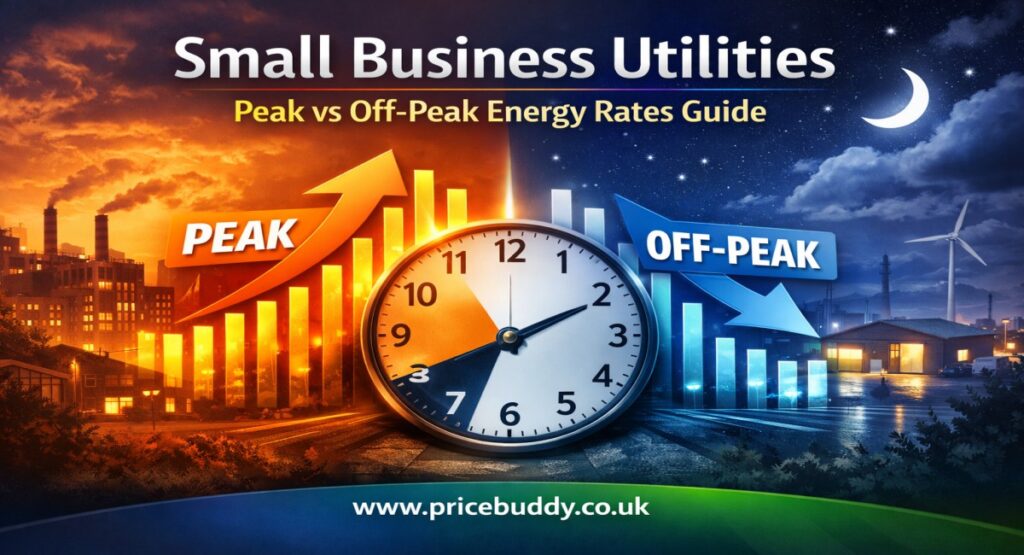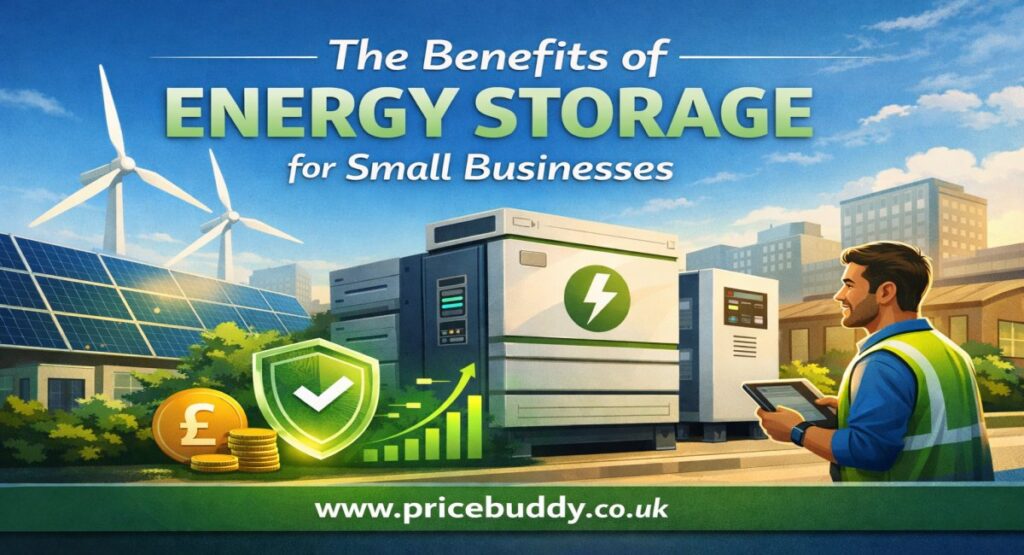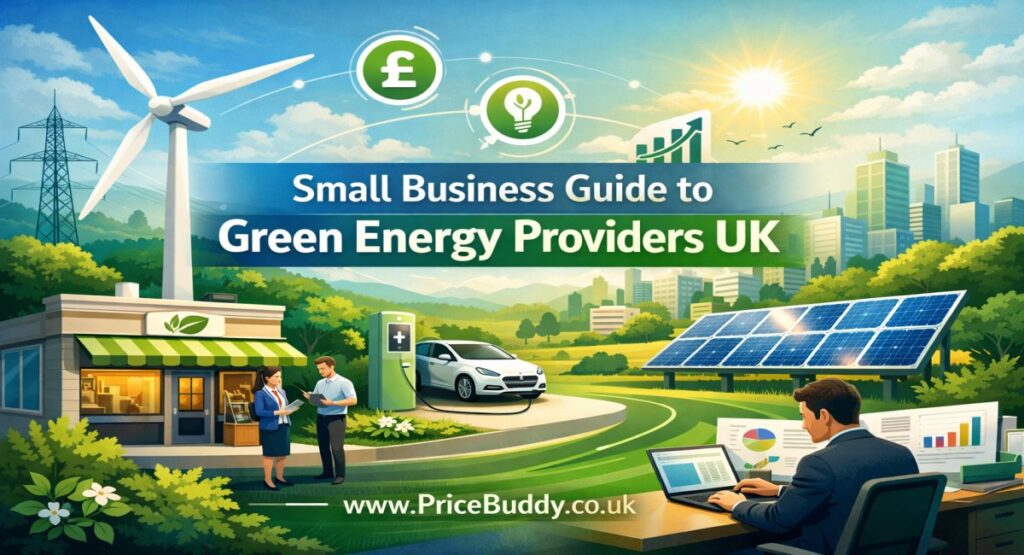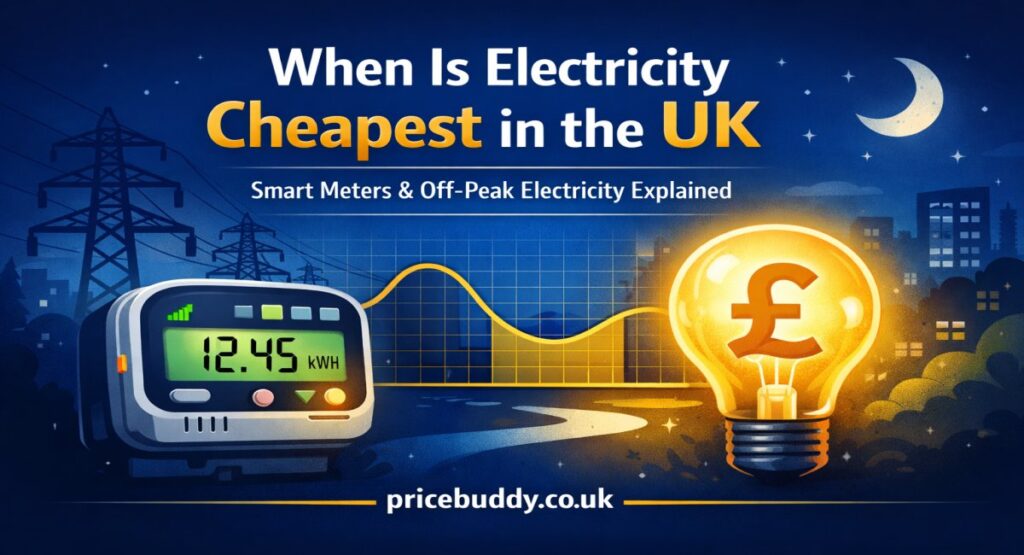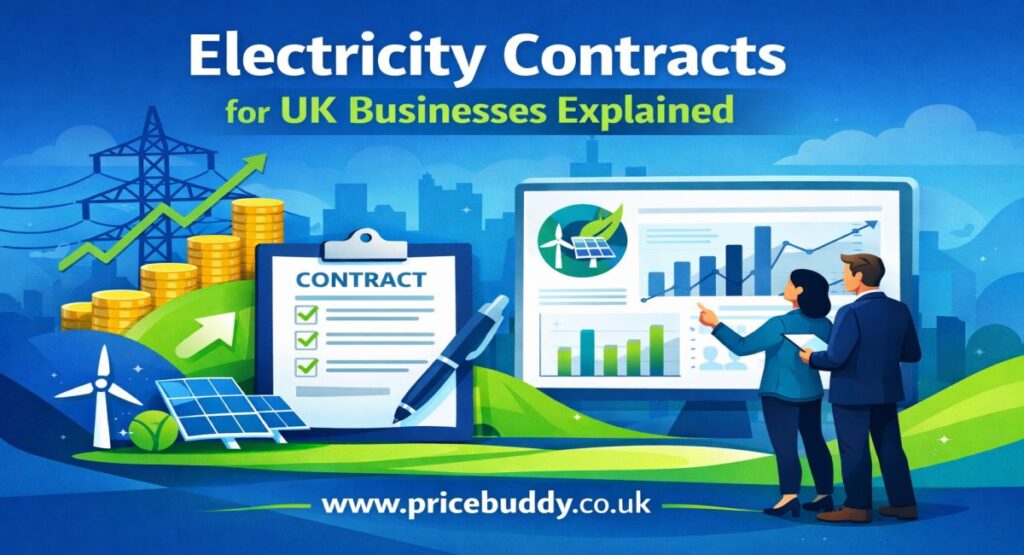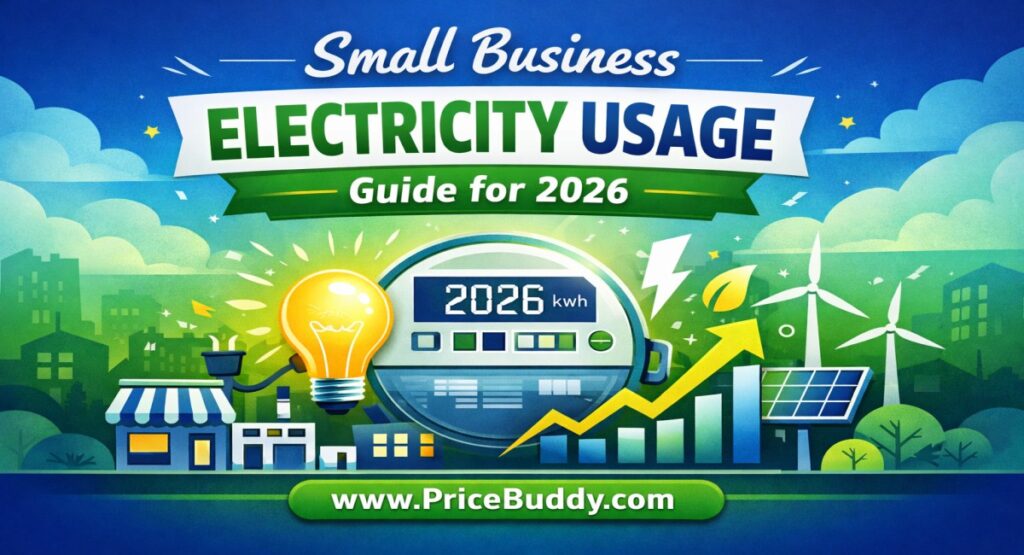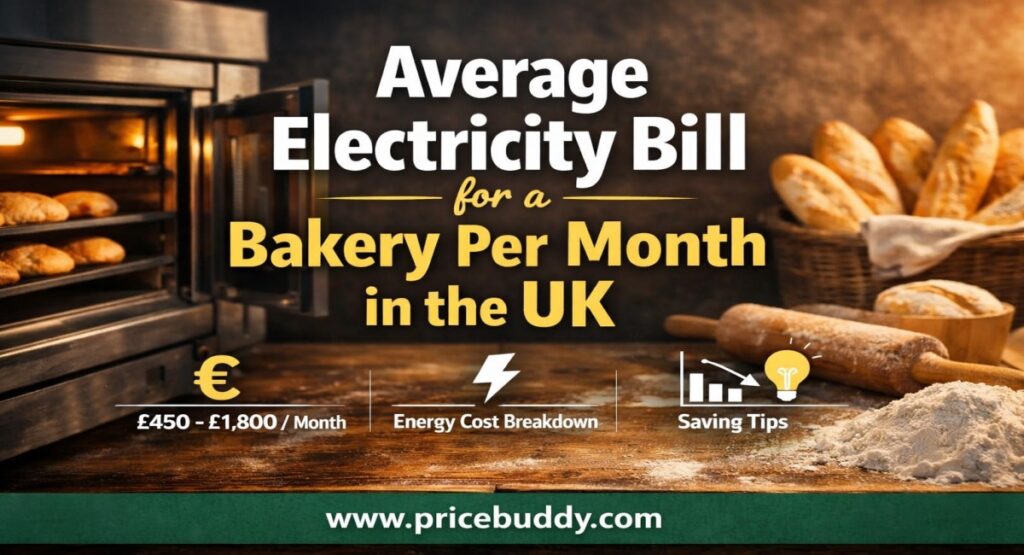Although it may not be the most thrilling thing on your to-do list, managing your company’s energy contract is one of the most crucial. If you miss important dates, you may be forced to pay high deemed rates or forfeit the opportunity to secure a better offer. Understanding how your Business Energy Contract operates is essential for effective cost control and informed future planning, regardless of the size of your company.
Everything you need to know about contract expiration dates, important terms, small business protections, and renewable energy options will be covered in this comprehensive guide. We at Price Buddy make sure you never pay more than you should by assisting companies all over the UK with contract comparison and switching.
What Is a Business Energy Contract?

An energy supplier and your company can enter into a legally binding agreement called a business energy contract. It lays out the conditions, expenses, and length of your energy supply. Business contracts, as opposed to domestic contracts, typically set rates for longer periods of time, allowing businesses to better plan their budgets. Suppliers are also guaranteed income and stability in the energy markets thanks to these agreements.
Types of Business Energy Contracts
These are various types of business energy contracts.
Fixed contracts: Prevent price increases by locking in a unit rate for the term. They are well-liked by SMEs and predictable.
Flexible contracts: These let you purchase energy in blocks, which is helpful for larger companies with higher energy usage who wish to profit from changes in the market.
Customized agreements: Made to meet the particular requirements of big businesses or operators of multiple locations. These agreements might contain provisions pertaining to sustainability, particular supply requirements, or customized billing.
How Contracts Differ from Domestic Energy Deals
Since business contracts usually don’t have cooling-off periods, it’s more difficult to back out after signing. Compared to domestic energy contracts, they are designed for greater usage and may include customized terms, exit fees, and more intricate renewal procedures. Additionally, domestic customers usually pay less VAT than businesses, which pay 20% (except charities and very small users, who may be eligible for reduced VAT).
Why Business Energy Contract End Dates Are Critical
Missing your contract end date can lead to costly rollover or deemed rates, making it one of the most crucial details to manage in your energy agreement.
Impact on Your Bills if You Miss Renewal
You risk being rolled onto far higher deemed rates if you don’t take action before your end date. This can result in paying between 30 and 50 percent more than the agreed-upon contract rates, which is an expensive mistake. For even small businesses, this could add up to thousands of pounds in preventable costs over the course of a year.
Deemed Contracts Explained
When your previous agreement expires without a new one being agreed upon, it becomes a deemed contract. Premium rates are charged by suppliers, and you no longer have cost control. These agreements are not intended to be long-term fixes, but rather temporary fixes. Prices can fluctuate without much notice, and they provide no security.
Rollover Contracts and Hidden Costs
Your contract may be automatically renewed by certain suppliers, frequently at less favorable prices. Even though automatic rollovers are now restricted by law, you should always carefully review your contract terms to prevent any unforeseen fees. Many companies don’t realize they’ve been taken advantage of until they receive their first inflated bill.
How to Find Your Business Energy Contract End Date

Knowing the exact date of your contract’s expiration allows you to compare better offers ahead of time and helps you avoid automatic rollovers.
- Where to Check: Contract Docs, Bills, Supplier Portal
Your end date is typically listed on your contract documents and monthly bills. You can also check through an online portal with many suppliers. While not all suppliers do this regularly, some even include reminders in billing statements.
- Requesting Details Directly from Your Supplier
Get in touch with your supplier directly if you have any questions. To avoid fines, ask them to confirm the end date of your contract as well as the window for termination. To ensure you have a paper trail, always ask for written confirmation via email.
- What to Do If You Can’t Locate Your Contract
Send an email requesting written confirmation if your supplier is not forthcoming. To avoid disagreements, preserve these correspondences for your records. A reputable broker or comparison service, such as Price Buddy, can find these details for you if you’re still having trouble.
Key Terms in Business Energy Contracts
You can prevent surprises and make wise decisions when switching or renewing your business energy contract by being aware of the key terms.
Contract Start Date vs. End Date
Your contract starts on the start date, and your agreed-upon rates expire on the end date. Missing the end date can trigger automatic moves to higher tariffs. To stay ahead, put both dates on your business calendar.
Termination Window Explained
You may be locked into the current supplier on bad terms if you miss this window, which is typically 30 to 120 days before the end of your contract, when you must inform your supplier of your intention to leave or renew.
Cooling-Off Periods for Small Business Energy Contracts
Some small business or microbusiness contracts provide limited protections, but the majority of business contracts do not permit cooling-off periods. Prior to signing, always review the terms. By being aware of these rights, you can avoid being forced into an inappropriate agreement.
Small Business Energy Contract Essentials
Knowing the fundamentals can help you save money and steer clear of common blunders because small businesses have particular protections and challenges when it comes to energy contracts.
Ofgem Rules for Microbusinesses
In order to safeguard microbusinesses, Ofgem has implemented regulations that guarantee more equitable notice durations, clear terms, and easier switching procedures. For instance, suppliers are required to give concise summaries of contracts and reminders when they are up for renewal.
How Protections Differ for Small vs. Large Businesses
Shorter renewal windows and more transparent termination notices are advantageous for small businesses. Although they have less regulatory protection, larger companies frequently negotiate custom contracts. This implies that SMEs occasionally have better protections than their larger counterparts.
Common Pitfalls for SMEs
SMEs frequently fail to observe their notice period, which results in needless expenses. Others miss out on lower tariffs available in the market because they don’t routinely compare contracts. Additionally, some people overestimate their consumption and sign contracts that don’t accurately reflect their actual usage.
Comparing Business Energy Contracts in the UK

By comparing contracts, you can make sure you get the best terms and rates, preventing your company from overspending on energy.
Checklist for Comparing Deals (Unit Rate, Standing Charge, VAT)
When comparing, consider:
- Unit rates (price per kWh)
- Standing charges (daily fixed costs)
- VAT and Climate Change Levy (CCL)
- Exit fees and contract length
- Renewable percentage of energy
Business Energy Contracts Compared UK: Best Practices
To compare several offers side by side, use brokers or reliable comparison websites. Make sure that all charges, not just unit rates, are included in comparisons. Seek out agreements that strike a balance between cost, flexibility, and future-proofing against growing expenses.
Using Brokers vs. Comparing Yourself
Brokers may be able to access exclusive deals and save time. To guarantee transparency and steer clear of unstated broker fees, compare separately as well. The best course of action is frequently a hybrid one that combines your own research with that of your broker.
Renewable Business Energy Contract Options
Investigating renewable energy contracts can help you reduce your carbon footprint and demonstrate your company’s dedication to sustainability.
Green Tariffs and Guarantees of Origin
A renewable business energy contract uses hydro, solar, or wind power to generate electricity. To demonstrate the renewable source, suppliers offer Guarantees of Origin. Your claims about sustainability gain credibility as a result.
Renewable Business Energy Contracts for SMEs
In order to meet customer expectations, enhance sustainability credentials, and lock in competitive rates, many SMEs are now implementing renewable contracts. More and more suppliers are catering to small businesses with packages that are exclusively renewable.
Corporate PPAs for Larger Businesses
Corporate Power Purchase Agreements (PPAs) let big companies buy electricity directly from renewable generators, which keeps prices stable over the long term. These partnerships can last for decades, giving companies financial certainty and helping them reach their net-zero goals.
Best Time to Switch Energy Contracts for Business

Timing your switch correctly helps you lock in better rates and avoid being stuck with expensive default tariffs.
90–120 Day Renewal Window Explained
The optimal time to switch is between 90 and 120 days before your contract finishes. This provides you enough time to compare, haggle, and avoid having to roll over at the last minute. Taking action early also lets you lock in prices before the market might go up.
How Market Timing Affects Your Costs
The energy markets are not static. You can save a lot of money by keeping an eye on trends and locking in contracts when prices drop. Companies that are proactive and knowledgeable are less vulnerable to fluctuations.
Negotiation Tactics to Get the Best Deal
Make use of quotes from several vendors, emphasize your volume or loyalty, and always request better terms before committing. For lower prices, think about combining several services, like gas and electricity.
Frequently Asked Questions
What is a deemed contract?
A deemed contract is when your business keeps using energy after your deal ends without a new agreement, usually at much higher rates.
Can I switch before my end date?
Yes, you can switch, but exit fees may apply unless you are in your contract’s termination window.
Do renewable business energy contracts cost more?
Not always are many renewable business energy contracts now priced competitively with standard tariffs.
How long does switching take?
Switching typically takes 4–6 weeks, but your energy supply will not be interrupted.
What happens if I don’t give notice?
You may be rolled into a new contract or placed on costly deemed rates if you miss your notice period.
Free Contract End Date Check & Quote Comparison
Your business energy contract end date is the one detail you cannot afford to ignore. Missing it leads to inflated costs, loss of choice, and unnecessary stress. By tracking your termination window, comparing business energy contracts in the UK, and considering renewable options, your business can save money and reduce its carbon footprint.
At Price Buddy, we are here to help you navigate the complexities of energy contracts, from small business energy contracts to large-scale renewable agreements. Take control today, and never miss a critical contract date again.

